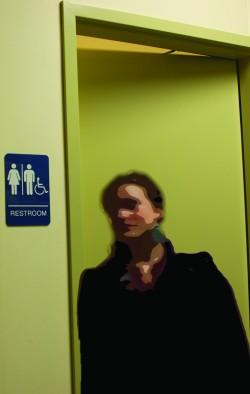
Imagine losing the support of your family, constantly living in fear of being bullied, and not being able to be who you really are because of fearing for your safety. This is often the reality for those who identify with being transgender. Due to suicide and violence, the average life expectancy for transgender individuals is 23 years old, according to Taran Smith, Central Oregon Community College student life coordinator.
Amelia, a transgender Central Oregon Community College student whose name has been changed to protect her identity, has faced bullying in the past. But to date, due to her anonymity, she has not experienced negativity at COCC.
“I finally got tired of fighting,” Amelia said. “It seems like with being transgender in society today you are constantly hitting your head against a brick wall that never goes anywhere.”
Amelia has let the discrimination she’s faced change the way she presents herself.
“I never used to be quiet about who I was,” Amelia said. “I used to be all about getting the word out there, I used to be an activist, but now I put it in a corner so I don’t have to put up with the negativity surrounding being transgender.”
Amelia has not heard from her family in over 15 years and said that is “their loss.”
“Family kept trying to change me,” Amelia said. “It left me no choice but to leave home. I just basically forgot that I even have a family.”
Amelia has not experienced bullying since coming to the COCC campus.
“That is one of the reasons I keep quiet; I try to avoid talking about it at all costs,” Amelia said. “Previously there was bullying and physical violence. It’s something that is difficult to talk about because I don’t want to be reminded of it.”
After leaving her family, Amelia said the only support she initially found was within the transgender community.
“Others transgender people understood what I was going through and were able to support me during that time,” Amelia said.
Stereotypes
The traditional male and female roles in society today contribute to the stereotypes surrounding the transgender community, according to Smith.
“Society as a whole is gender specific,” Smith said. “Change starts with not stereotyping certain genders. Gender stereotypes are ingrained into us.”
The move to create acceptance and equal rights for the transgender community is similar to movements for equality for certain groups in the past, according to Karen Roth, director of multicultural activities.
“One of society’s main goals is to keep everyone ‘in line,’” Roth said. “Over the course of centuries of existence there have been defined rules for men and women. This can increase the difficulty for someone who identifies with being transgender.”
If an individual feels they do not fit into the traditional role of male or female, it can be a challenge to fight against the stereotypes, Roth explained.
“I don’t know why it elicits so much violence if anyone is living a life that doesn’t fit into the typical roles,” Roth said. “If someone does not identify with a particular gender they can feel alienated.”
There is often a fear that can prevent individuals from being open, Roth explained.
“Being open puts someone in a vulnerable place to be bullied,” Roth said. “It is particularly hard if someone transitions as an adult; the community might not understand.”
This fear is something that leads Amelia to keep quiet after her transition.
“I don’t think anyone wants to stand out,” Amelia said. “It would be really nice to convince everyone that we are normal people who want to be left alone. Fear can make it extremely difficult to open the door and be who you are.”
Developing awareness and creating an accepting community
The picture often given to society by the media contributes to the stereotypes surrounding the transgender community, according to Roth.
“This movement is similar to all other movements,” Roth explained. “The more we have people in the workplace who are willing to come out about their gender association, and we care about them, the stereotypes begin to fade away.”
Amelia agrees that education and awareness would help to get rid of stereotypes facing the transgender community.
“Change starts with education,” Amelia said. “The more people we can get to understand the issues, the more we can inform about situations, the more accepting society would be.”
In addition to developing awareness, there are a few other solutions that would help encourage acceptance, according to Roth.
“The one thing I find very useful when people are struggling to understand others is put yourselves in their shoes,” Roth said. “All it takes is to open your heart to some level of empathy and understanding. There is a lot more compassion and understanding inside of you than you thought.”
Amelia believes that a “perfect society” would be one of “simple acceptance.” She has hope that the next generation will help to encourage acceptance within the transgender community.
“Hopefully there is a new generation coming that would be more accepting,” Amelia said.
“For anyone in the coming out process be brave, be yourself. It will be difficult but it will get better.”
Transgender awareness week
Nov. 18-22 is national transgender awareness week and Nov. 20 is transgender day of remembrance. To honor this week and support students, staff, and faculty in the transgender community, COCC will be providing gender neutral bathrooms in the Campus Center Building.
Bathrooms and locker rooms that are gender exclusive are often one of the main places transgender individual face discomfort, violence, and even physical harassment, according to Roth.
“The big thing that we would hope for the transgender awareness week is that it would be informative to people about the stereotypes transgender individuals face,” Roth said. “Nov. 20 is a day we can remember transgender individuals who were victims of violence or suicide because of their gender identification.”
Gender inclusive bathrooms are an important part of creating an inclusive society, according to Lindsay Buccafurni, campus center building specialist.
“It is a way we can acknowledge the needs of a specific group while including everyone,” Buccafurni said. “We want the transgender community to feel appreciated and valued and by honoring this week we hope to do that.”
Molly Svendsen
The Broadside







